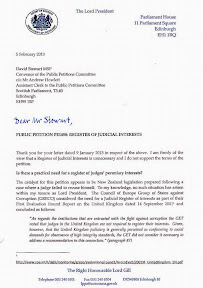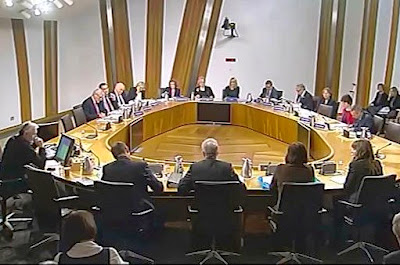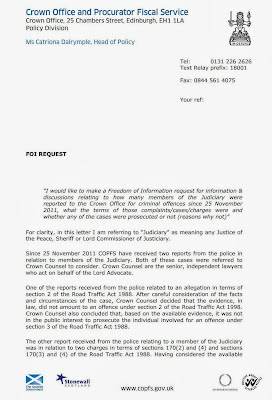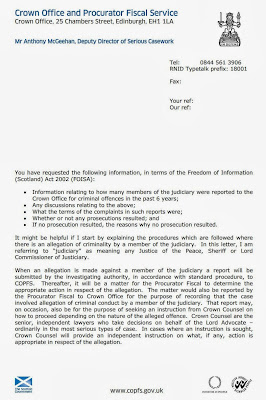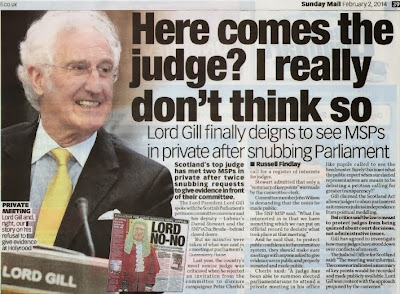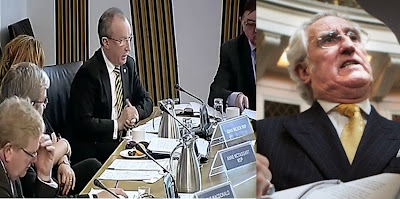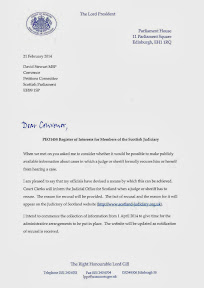 Scotland’s rich judges act more like unaccountable directors of a business called justice. SCOTLAND’S judiciary are a group of select, predominantly white, extremely wealthy influential lawyers who have an unelected and almost unchallengeable power to stall or close debate on their own secret vested interests, change any of our lives at the stroke of a pen, or strike down legislation desired by the greater community and voted through by democratically elected politicians in our own Scottish Parliament.
Scotland’s rich judges act more like unaccountable directors of a business called justice. SCOTLAND’S judiciary are a group of select, predominantly white, extremely wealthy influential lawyers who have an unelected and almost unchallengeable power to stall or close debate on their own secret vested interests, change any of our lives at the stroke of a pen, or strike down legislation desired by the greater community and voted through by democratically elected politicians in our own Scottish Parliament.
Clearly any group in society which has this almost limitless power, must above all, be as transparent as other branches of government and society to which it applies its rulings. But, as we have found out during a full year of debate at the Scottish Parliament’s Public Petitions Committee, if anything, the judges are even more secret than the secret service itself when it comes to the thorny question of judges pecuniary and other interests.
Their personal, undeclared wealth including extensive family and business links throughout the legal profession, offshore ‘tax efficient’ trusts, ownership of numerous and high value properties through a variety of interesting arrangements, investments, directorships and shareholdings, collectively generate millions of pounds in earnings for the judges and their families each year.
Yet, to-date, not one court user, not one member of the public, not one accused person, nor the media or even our own members of the Scottish parliament have had the chance to scrutinise and question judges about their vested financial interests, as there is no register of judicial interests or any effective method of ensuring the judiciary declare their positions, connections and interests in a publicly available document as called for in Petition PE1458: Register of Interests for members of Scotland's judiciary.
You will never see a judge come out of a food bank, even though at least one judge was charged with cheating the benefits system and others regularly claim poverty when faced with the prospect of investigations into their tax affairs, civil litigation or even seizure of their assets.
You will never see a judge on the homeless register – even though it turns out a good few of them curiously appear to own no property at all – preferring instead to rely on “creative property owning solutions” carefully constructed by their chosen law firms who create tax dodging trusts to get round inheritance taxes & capital gains taxes while the rest of the country are required to pay up, on penalty of the prospect of appearing before these same tax dodging judges who fail to recuse themselves over their own dodgy financial arrangements.
And, its not just the judges. Their families often share in this wealthy backslapping system where spouses, children and relatives end up in law firms, investment houses, banks and other professions and yet nothing, not a hint is ever declared when one of them or their firm ends up in front of their relatives on the bench.
In one example known to journalists, the son of one Scottish judge was given a prestigious job in a London based bank, simply because his father is a judge. Yet this individual, like another famous name who is generally considered to have ruined the UK’s biggest bank, had no qualifications necessary to undertake financial transactions of a scale entrusted to him, and thus went on to lose clients hundreds of thousands of pounds while fiddling his commissions and expenses claims.
Senior staff at this well known bank - which received massive financial bailouts from taxpayers after the banking crash of 2008, felt they could not sack the judge’s son, due to his father’s position on the bench. As losses to clients mounted and he cheated the bank even more, staff just had to wait on him departing of his own accord after “he became bored”.
But, it wasn't all bad news for the bank. In all of the cases in which this bank and other financial institutions linked to it or owned by it have appeared as a litigant in Scotland’s courts, not one recusal by the judge, or a number of his judicial colleagues who also have links to, and investments in the same bank, has ever taken place or been recorded in any document or even in published court opinions on cases which the bank won.
Another Scottish bank, well known for sponsoring events held by the Law Society of Scotland has relied on millions of pounds of business from many of Scotland’s law firms who have banked their client fund accounts there. These same law firms have employed some of our current judges in speaking events and other business.
But whenever questions arise over missing client funds involving solicitors and this same bank or its subsidiaries, and these cases eventually get to court and in front of a judge, don’t expect a recusal or anyone to bother asking, as there have been none.
Renewable energy. Yes. Members of Scotland’s judiciary were quick to spot the earnings potential of windmills, wave power and tree hugging. Yet while many judges have chose to invest in renewables, as well as adding a few of their siblings to the companies they invest in, there have been no recorded recusals when any renewable energy firms or their business ventures have appeared before our judges in Scotland’s highest courts.
Insurance. Members of Scotland’s judiciary on £150K plus a year have always viewed the insurance industry as a great little earner, yet when things go wrong, a few of the judges have suddenly claimed poverty to evade paying out rather than their investments paying them. Ever so dishonest, although it appears no action against any of the judicial dodgers was ever taken.
Its not all just about interests and money. Persons accused of criminal offences and their legal teams are not able to consult any register of interests to decide if the judge hearing the case may be required to recuse themselves.
A high profile case involving William Beck, who was wrongfully convicted of an offence saw Mr Beck appeal against his conviction only to be denied by the son of the judge who sent him to jail in the first place.
And then at a further appeal, Mr Beck encounter another judge who had prosecuted him and sent him to jail. The judge, Lord Osborne, claimed he had forgot and would have recused himself if he had remembered – yet his explanation has been rubbished by papers submitted to the court in which Osborne’s name as prosecutor appeared. Read more on this here: Failure to Recuse : Evidence handed to MSPs in judicial register of interests proposal reveals judges who blocked injustice appeal failed to declare interests in court
It is not so difficult to understand why a register of judicial interests is required.
When taxpayers throw massive £150K-£250K salaries and million pound plus pensions at what is ostensibly a former solicitor who sits in a court for a few hours a day looking old, bored & snored because he knows exactly how he is going to rule from the very outset, it should come as no surprise these same judges make sure their salaries and other undeclared earnings are dealt with in as tax efficient and income generating a way as possible. After all, they are in a position to ensure this, they have the influence to do this and they have written their own rules so no one can view this.
Indeed, such are the scale of the judges financial interests and undeclared earnings, it is little wonder Lord Gill felt safe enough to tell msps on the Scottish Parliament’s Petitions Committee that it would be almost impossible for judges to detail all their interests .. because if they did, there is a good chance hardly any case in Scotland’s courts could ever again be viewed as honest.
And even without all these revelations, the reasons why the judiciary should be required to comply with a register of interests are very simple to understand.
As serving members of the judiciary who claim to be bound by oaths and rules which now appear to have little credibility, these same judges have confirmed there is something to hide. It simply cannot be that the entire class of judiciary are exempt from the same levels of transparency as other branches of government and civil servants are required to follow. There is no excuse, no legitimate exemption.
The judiciary, and the Lord President himself, by opposing transparency to the point of threatening the foundations of the Scottish Parliament itself, have all lost sight of their service to the wider community, their obligations to the same levels of transparency they enforce in their own courts, and the needs of transparency in all branches of government in Scotland and the rest of the country.
If Scotland’s justice system is to be trusted, a fully transparent and detailed register of judicial interests with rules and guidance policed by an independent authority not connected to the judiciary, must be created.
Otherwise, litigants, court users, accused persons and even those solicitors who do try for their clients, are simply attending what is little more than a board meeting of a bunch of directors who more often than not have a vested interest in YOUR access to justice being denied.
HOW TOP JUDGE PROTESTED AGAINST TRANSPARENCY REGISTER:
Lord Gill’s first letter to MSPs voiced vociferous opposition to transparency. In Lord Gill’s opening letter to MSPs on the call for a register of judicial interests, the judge claimed “In practical terms it would be impossible for all judicial office holders to identify all the interests that could conceivably arise in any future case. The terms of the Judicial Oath and the Statement of Principles of Judicial Ethics ensure that such a difficulty does not arise and that the onus is on the judicial office holder to declare any interest at the outset.”
In what was surely a hint of the sheer hostility felt by the judiciary against a call to bring transparency to judges interests, Lord Gill went onto accuse the media, press, litigants, court users and just about everyone else with an interest in transparency of being potentially hostile and aggressive, simply because someone may wish to raise questions of judges interests similar to the same kinds of questions which are raised of interests in other public officials and those in public life, politics & government.
Clearly angered by the call for transparency, Lord Gill’s letter to MSPs stated: “The introduction of such a register could also have unintended consequences. Consideration requires to be given to judges' privacy and freedom from harassment by aggressive media or hostile individuals, including dissatisfied litigants. It is possible that the information held on such a register could be abused. These are significant concerns. If publicly criticised or attacked, the judicial office holder cannot publicly defend himself or herself, unlike a politician. The establishment of such a register therefore may have the unintended consequence of eroding public confidence in the Judiciary. It also raises the question whether such a measure would have an adverse impact on the recruitment and retention of the Judiciary.”
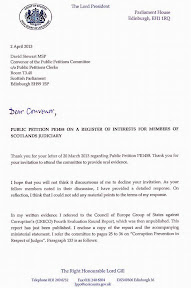 Top judge Lord Gill refused to go to Holyrood, by letter. In a second reply to the Convener of the PPC, dated 2 April 2013, Lord Gill refused an invitation to attend the Scottish Parliament and face questions from Committee members on issues raised in the petition and to explain his own opposition to the transparency proposal.
Top judge Lord Gill refused to go to Holyrood, by letter. In a second reply to the Convener of the PPC, dated 2 April 2013, Lord Gill refused an invitation to attend the Scottish Parliament and face questions from Committee members on issues raised in the petition and to explain his own opposition to the transparency proposal.
Notably, Gill’s second reply did not contain any answers to questions put to him in writing by the Petitions Committee, nor did the judge provide any statistical or analytical evidence on the numbers of recusals which have been undertaken by judges in Scotland’s courts. However, seeking once again to lobby MSPs against any call for transparency of judges interests, the Lord President again referred to the content of an EU report, itself written by judges, who claimed there was no need for a register of judicial interests.
A further invitation was sent to Lord Gill by the Convener of the Public Petitions Committee, asking for answers to questions and again inviting the Lord President to addend the Scottish Parliament to give evidence on Petition PE1458: Register of Interests for members of Scotland's judiciary
Third letter from top judge refused Holyrood invitation, used Scotland Act loophole. Having received the third letter containing a second invitation to attend Holyrood, Lord Gill wrote back to the Convener of the Public Petitions Committee on the 28 May 2013, again refusing to appear before MSPs to face questions on judges interests and his own opposition to the petition.
However, this time the top judge added a hint that judicial cooperation with Committees of the Scottish Parliament may suffer and must be limited.
In what appears to have been little short of a veiled threat to refuse further judicial cooperation with, and future Committee appearances at the Scottish Parliament, Gill stated: “Judges have from time to time given evidence to committees of the Scottish Parliament on matters that affect the administration of justice in Scotland. I hope that that has been helpful in the legislative process. Judicial participation in the work of the committees must however be kept within prudent limits.”
And, shockingly, Lord Gill then sought to use deficiencies in the Scotland Act to justify his refusal to attend the Public Petitions Committee and answer question from msps.
 Gill’s use of Scotland Act against MSPs was reported in the media. Writing in his third letter, Lord Gill said: “Section 23(7) of the Scotland Act provides inter alia that the Parliament may not require a judge to attend its proceedings for the purposes of giving evidence. This is not a loophole. It is a necessary part of the constitutional settlement by which the Parliament is established. Its purpose is to protect the independence of the judiciary, a vital constitutional principle that is declared in section 1 of the Judiciary and Courts (Scotland) Act 2008”
Gill’s use of Scotland Act against MSPs was reported in the media. Writing in his third letter, Lord Gill said: “Section 23(7) of the Scotland Act provides inter alia that the Parliament may not require a judge to attend its proceedings for the purposes of giving evidence. This is not a loophole. It is a necessary part of the constitutional settlement by which the Parliament is established. Its purpose is to protect the independence of the judiciary, a vital constitutional principle that is declared in section 1 of the Judiciary and Courts (Scotland) Act 2008”
The judge continued: “When a committee invites a judge to give evidence before it, I have to decide whether the subject matter might infringe the principle of judicial independence; and whether the evidence required could be satisfactorily given in writing.”
Previous articles on the lack of transparency within Scotland’s judiciary, investigations by Diary of Injustice including reports from the Sunday Mail newspaper, and video footage of debates at the Scottish Parliament’s Public Petitions Committee deliberations on Petition PE1458: Register of Interests for members of Scotland's judiciary can be found here : A Register of Interests for Scotland's Judiciary
